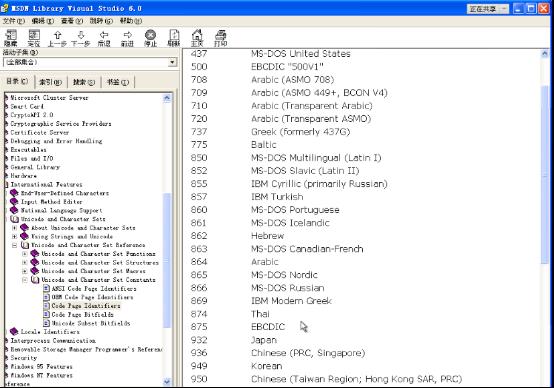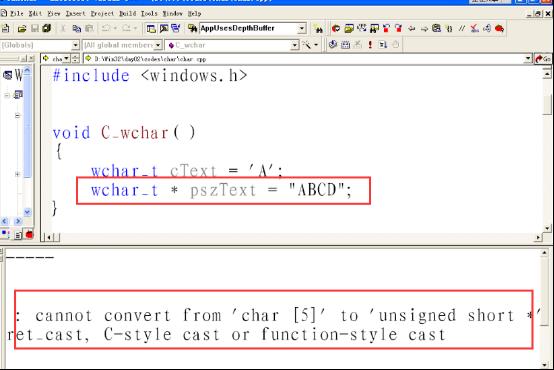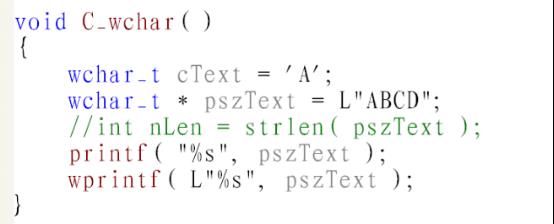win32day02-字符与编码
Posted 吴英强
tags:
篇首语:本文由小常识网(cha138.com)小编为大家整理,主要介绍了win32day02-字符与编码相关的知识,希望对你有一定的参考价值。
字符编码
2.1 编码的历史
2.1.1 ASCII 0-127 7位表示
2.1.2 ASCII扩展码 0-255 8位表示
代码页:通过代码页来切换对应的字符
2.1.3 双字节字符集 DBCS
使用一个或两个字节表示字符.
"A中B国"
12 1 2
A: 0x41 中:0x8051
B: 0x42 国:0x8253
1 2 3 4 5 6
0x41 0x80 0x51 0x42 0x82 0x53
A 中 B 国
2.1.4 Unicode
全部使用2个字节表示字符
"A 中 B国"
2 2 2 2
A: 0x0041 中:0x8051
B: 0x0042 国:0x8253
------------内存当中,小字节在前,高字节在后------------
1 2 3 4 5 6 7 8
41 00 51 80 42 00 53 82
带来的问题:??
内存/硬盘等资源占用变大.
对编程支持度.c语言输出字符串,遇到\\0结束。
C语言和编码
2.2.1 单字节的字符和字符串
char cText = 'A';
char * pszText = "ABCD";
2.2.2 宽字节的字符
wchar_t cText = 'A'
wchar_t * pszText = L"ABCD";
2.2.3 相关函数
单字字符的函数,对应有多.宽字节的函数.
strlen wcslen mbslen
printf wprintf
2.2.4 TCHAR
为了程序中可以方便的支持的Unicode和多字节字符等,所以使用TCHAR来定义字符和字符串.
根据_UNICODE宏开关,会将TCHAR编译成不同字符类型.
#ifndef _UNICODE
typedef char TCHAR
#define __T(x) x
#else
typedef wchar_t TCHAR
#define __T(x) L##x
#endif
使用时,要增加TCHAR.H头文件支持,使用_UNICODE宏开关进行编译
CL window.c /D_UNICODE
或者在程序中
#define _UNICODE
#include "tchar.h"
定义方式:
TCAHR * pszText = __T("ABCDEF");
代码使用:使用UNICODE宏开关,通知编译器选择编译的代码.
#ifndef _UNICODE
int nLen = strlen( pszText );
#else
int nLen = wcslen( pszText );
#endif
2.2.5 Unicode的控制台打印
BOOL WriteConsole(
HANDLE hConsoleOutput, //控制台输出流的句柄
CONST VOID *lpBuffer,//输出的字符串的指针
DWORD nNumberOfCharsToWrite,//输出的字符串的长度
LPDWORD lpNumberOfCharsWritten,
// 返回已输出字符的数量
LPVOID lpReserved ); // 保留值
打印256个字符,ascII码
一个字符一个字符的显示, 第7个字符会听到b的一声。0-127是ascii字符,128-255是一堆问号。
因:128以上为中文的代码页,而中文需要2个字符表示。
设置code-page代码页;


需要加一个L, 双字节字符串定义。
Wchar_t *pszText = L”ABCD”;
Wprintf, 双字节字符的打印函数

宽字节字符串,
多字节字符串
Wchar_t *pwszChs = L”我是程序员”;//unicode码 len=5
Char *pszChs = “我是程序员”;//len = 10
Unicode码是宽字节字符中的一种。
// char.cpp : Defines the entry point for the console application.
//
#include "stdafx.h"
#include "stdlib.h"
#include "string.h"
#define _UNICODE
#include "tchar.h"
#include <windows.h>
// #ifndef _UNICODE
// typedef char TCHAR
// #define __T(x) x
// #else
// typedef wchar_t TCHAR
// #define __T(x) L##x
// #endif
// UNICODE
// wchar_t * pszText = L"我是程序员";
// MUTIBYTE
// char * pszText = "我是程序员";
void tchar( )
TCHAR * pszText = __T("我是程序员") ;
void C_wchar( )
wchar_t cText = 'A';
wchar_t * pszText = L"ABCD";
int nLen = wcslen( pszText );
printf( "%d %s\\n", nLen, pszText );
wprintf( L"%s\\n", pszText );
wchar_t * pwszChs = L"我是程序员";
nLen = wcslen( pwszChs );
wprintf( L"W: %d %s\\n", nLen, pwszChs );//printf打印不出来unicode码中文字符
char * pszChs = "我是程序员";
nLen = strlen( pszChs );
printf( "M %d %s\\n", nLen, pszChs );
void CoadPage( int nCodePage )
SetConsoleOutputCP( nCodePage );
char cText = 0;
for( int nIndex=0; nIndex<256; nIndex++ )
printf( "%c ", cText );
cText++;
void ASCII( )
char cText = 0;
for( int nIndex=0; nIndex<256; nIndex++ )
printf( "%c ", cText );
cText++;
void c_char( )
char * pszText = "Hello World!\\n";
int nLen = strlen( pszText );
printf( "%d, %s", nLen, pszText );
int main(int argc, char* argv[])
//c_char( );
//ASCII( );
//printf( "\\n-------------------\\n" );
//CoadPage( 437 );
//CoadPage( 936 );
C_wchar();
return 0;
#include "stdafx.h"
#include "stdlib.h"
#include "string.h"
#define _UNICODE
#include "tchar.h"
#include <windows.h>
void PrintUnicode( )
HANDLE hOut =
GetStdHandle( STD_OUTPUT_HANDLE );
wchar_t * pszText = L"我是程序员";
WriteConsoleW( hOut,pszText,
wcslen(pszText), NULL, NULL );
wchar_t szText[2] = 0 ;
for( BYTE nHigh=0x48; nHigh<0x9F; nHigh++ )
for( BYTE nLow=0; nLow<0xFF; nLow++ )
szText[0] = MAKEWORD( nLow, nHigh );
WriteConsoleW( hOut,szText,
wcslen(szText), NULL, NULL );
int main(int argc, char* argv[])
PrintUnicode( );
return 0;
Win32程序与编码
2.3.1 Win32 API的定义
每个API对多字节字符和UNICODE分别有不同的版本.
MessageBox
MessageBoxA 多字节字符
MessageBoxW UNICODE字符
2.3.2 字符的定义,使用TEXT,由Winnt.h提供定义
#ifdef UNICODE
#define __TEXT(quote) L##quote
#else /* UNICODE */
#define __TEXT(quote) quote
#endif /* UNICODE */
TCHAR * pszText = TEXT( "ABCD" );
2.3.3 字符转换
int WideCharToMultiByte(
UINT CodePage, //代码页
DWORD dwFlags, //转换方式
LPCWSTR lpWideCharStr, //需要被转换WCHAR地址
int cchWideChar, //需要被转换WCHAR的长度
LPSTR lpMultiByteStr,//用于存放转换后的结果BUFF
int cchMultiByte, //BUFF的长度
LPCSTR lpDefaultChar,//使用的缺省字符串的地址
LPBOOL lpUsedDefaultChar //缺省字符串被使用的标识
);
int MultiByteToWideChar(
UINT CodePage,// 代码页
DWORD dwFlags,// 转换方式
LPCSTR lpMultiByteStr, // 需要被转换CHAR地址
int cchMultiByte,//需要被转换CHAR的长度
LPWSTR lpWideCharStr,//用于存放转换后的结果BUFF
int cchWideChar );//BUFF的长度
使用方法:
1 将要转换的字符串,传递给函数,从返回值中获取转换后字符串的长度。
2 分配字符串空间
3 再次调用函数,并将分配的空间传递给函数,获取结果.
// WinChar.cpp : Defines the entry point for the application.
//
#include "stdafx.h"
#include "stdlib.h"
/*
int WINAPI MessageBoxA(
HWND hWnd ,
LPCSTR lpText,
LPCSTR lpCaption,
UINT uType);
int WINAPI MessageBoxW(
HWND hWnd ,
LPCWSTR lpText,
LPCWSTR lpCaption,
UINT uType);
#ifdef UNICODE
#define MessageBox MessageBoxW
#else
#define MessageBox MessageBoxA
#endif // !UNICODE
*/
void MyMessageBox( )
MessageBox( NULL, TEXT("Hello Wide"),
TEXT("Wide"), MB_OK );
void Wide2Multi( )
WCHAR * pwszText = L"Wide2Multi";
//计算转换后的字符串长度
int nLen = WideCharToMultiByte(
CP_ACP, 0, pwszText, wcslen(pwszText),
NULL, 0, NULL, NULL );
//分配内存
char * pszText = (char *)malloc( nLen );
//获取结果
WideCharToMultiByte(
CP_ACP, 0, pwszText, wcslen(pwszText),
pszText, nLen, NULL, NULL );
//
MessageBoxA( NULL, pszText, "Multi", MB_OK );
free( pszText );
void Multi2Wide( )
CHAR * pszText = "Multi2Wide";
//获取转换后需要的BUFF的长度
int nLen = MultiByteToWideChar( CP_ACP,
0, pszText, strlen(pszText),
NULL, 0 );
//分配BUFF的空间
WCHAR * pwszText =
(WCHAR *)malloc( nLen * sizeof(WCHAR) );
//进行转换
MultiByteToWideChar( CP_ACP,
0, pszText, strlen(pszText),
pwszText, nLen );
MessageBoxW( NULL,pwszText,
L"Wide", MB_OK );
free( pwszText );
int APIENTRY WinMain(HINSTANCE hInstance,
HINSTANCE hPrevInstance,
LPSTR lpCmdLine,
int nCmdShow)
//Multi2Wide( );
Wide2Multi( );
return 0;
以上是关于win32day02-字符与编码的主要内容,如果未能解决你的问题,请参考以下文章